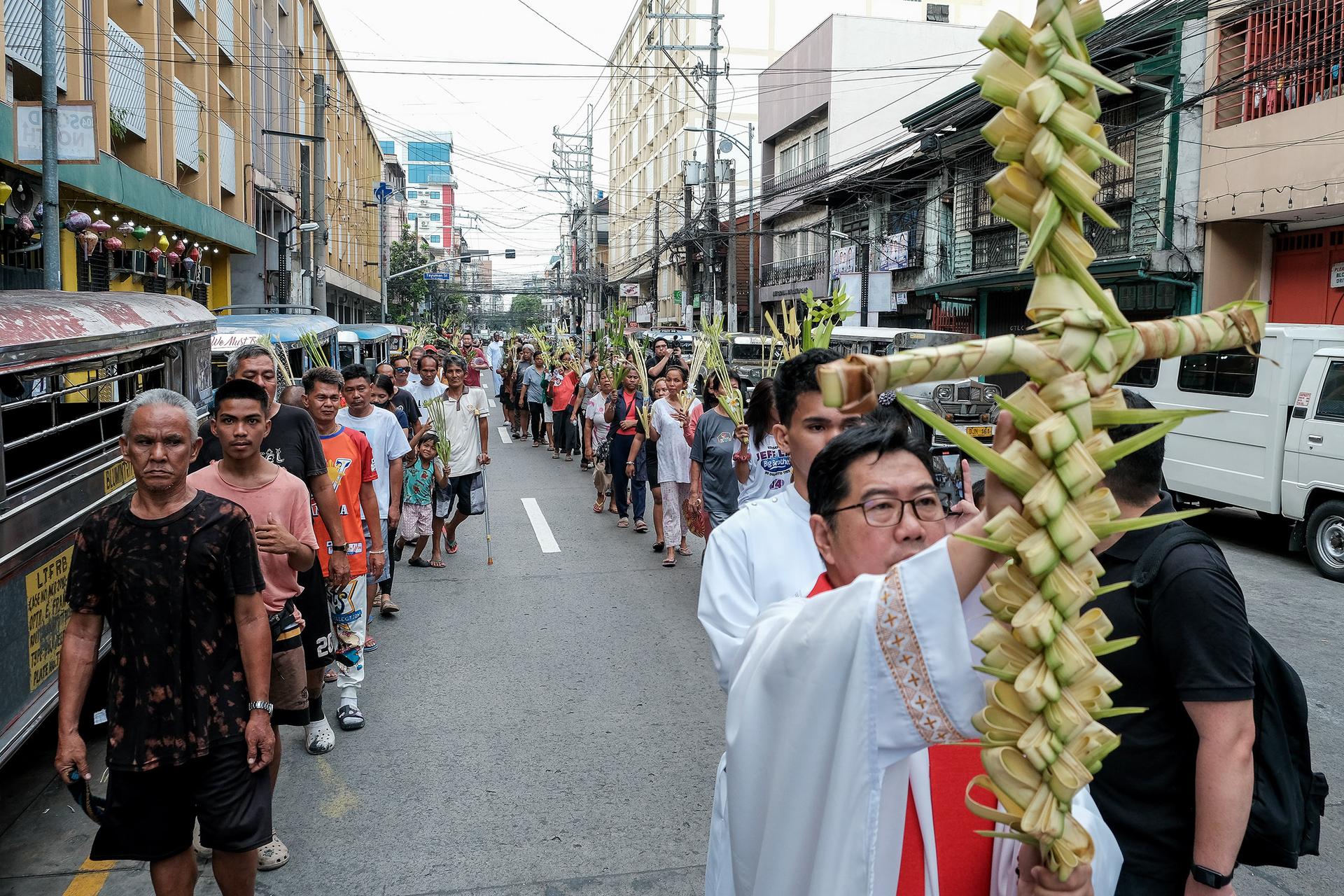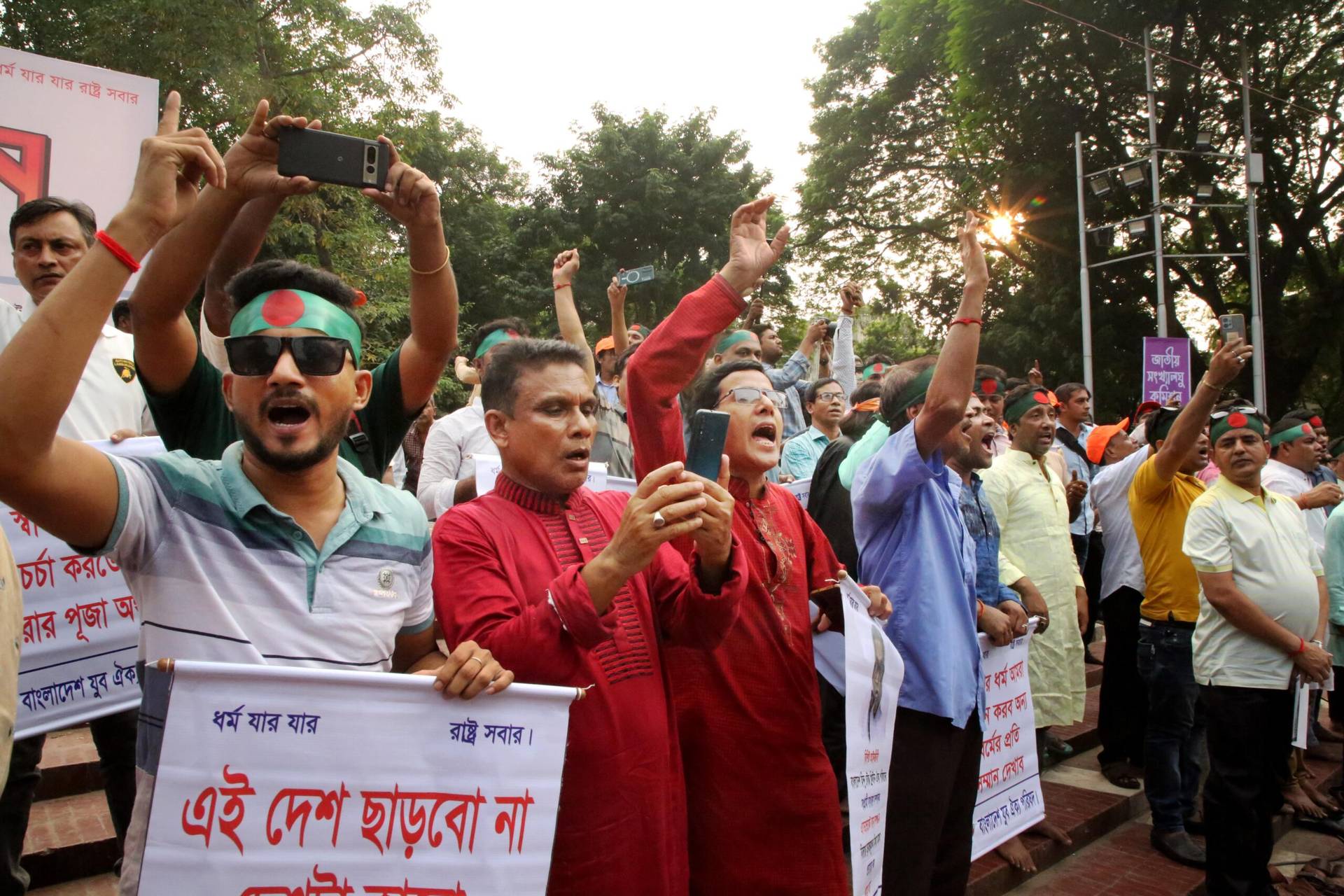MANILA, Philippines – Dozens of homeless persons and relatives of Duterte drug war victims gathered in Manila to celebrate Palm Sunday, April 13, as a prominent missionary priest challenged them to find hope in the face of suffering.
The blessing of palms at the Catholic Trade Building along Oroquieta Road in Manila was led by Divine Word Missionary Father Flavie Villanueva, a critic of former president Rodrigo Duterte’s war on drugs.
The relatives of drug war victims held up photos of the dead, even as they waved their palm fronds, in the Palm Sunday ritual that symbolized Jesus’ entry into Jerusalem. Villanueva sprinkled holy water on the palms and the photos as he passed by.
The homeless persons, many of whom wore worn-out house clothes, also held their own palm fronds. They were set to participate in Villanueva’s feeding and bathing program in a nearby center later on Sunday.
“Christ calls us to join in his suffering. Our suffering happens every day, as we grieve, as we look for something to eat. Death came because our loved ones were shot, our loved ones were killed,” said Villanueva after the blessing. “We face death every day.”
Villanueva urged them to embrace the cross of Jesus, so that they may also participate in Jesus’ resurrection on the third day.
“We hold on to Jesus’s resurrection that came from death. We all suffer sorrow and death just as Jesus suffered. But, if we faithfully follow in the footsteps of Jesus in his sorrow and death, we will surely also be able to follow in his resurrection,” the missionary priest said.
After the blessing of the palm fronds at the Catholic Trade Building, the drug war victims’ relatives held a meeting in one of the building’s offices. The homeless persons, on the other hand, exited the gate and went on a 10-minute procession — led by Villanueva himself — to the Arnold Janssen Kalinga Center at the nearby Tayuman Street.
The Arnold Janssen Kalinga Center is a nearly decade-old temporary shelter that provides meals, showers, and clothes to Manila’s homeless.
Villanueva, a former drug addict before entering the priesthood, founded the center in July 2015 and named it after the German missionary priest Saint Arnold Janssen. It was Janssen who founded the Society of the Divine Word, the religious order where Villanueva belongs, in 1875.
Villanueva also led a Mass at the Arnold Janssen Kalinga Center, where his homily also focused on hope. The Mass was followed by the center’s regular feeding and bathing program for homeless individuals.
In an interview with reporters after the Mass, Villanueva connected the day’s Gospel reading to Duterte’s crimes against humanity case at the International Criminal Court (ICC).
Duterte, 80, is detained at the ICC over the alleged killing of around 30,000 Filipinos under his watch.
“In the liturgy of Palm Sunday, the people shouted: ‘Crucify him, crucify him, crucify him!’ The cries of these people are no different from Duterte’s ‘kill, kill, kill!’” said Villanueva.
He said Duterte’s ICC case, however, provided healing for drug war victims’ families. He added that these families gained strength from the Marcos government’s cooperation in having Duterte arrested.
“To the former president, as you are in jail right now, the call for you is prayer, reflection, and repentance,” Villanueva said.
Making sense of suffering was also the theme of Palm Sunday homilies in different churches across the Philippines, a country of around 86 million Catholics.
Cardinal Pablo Virgilio David, bishop of Kalookan and president of the Catholic Bishops’ Conference of the Philippines, zeroed in on the death penalty in his Palm Sunday homily.
“Thanks be to God that the death penalty has been abolished in the laws of our country, the Philippines. It is indeed true that the law is often weaponized against innocent people, especially those whom the powerful wish to silence or persecute,” said David.
David then recounted periods in Philippine history when the death penalty was imposed — including in the mid-1800s when three Filipino priests were executed by garrote under Spanish colonizers. He also referred to extrajudicial killings — “illegal forms of execution silently tolerated by many Filipinos who believed it was an effective way of dealing with criminality.”
David, a biblical scholar, connected this to the way Jesus “faced his own death sentence.” Jesus, according to David, remained calm, stood firm, rejected violence, and forgave his tormentors. He also “offered hope — such as when he gave words of assurance to the thief crucified beside him on Calvary.”
The palm branches of Palm Sunday, he explained, symbolize “peace of heart in the face of trials.” He said that for Israel, palms “served as a reminder of their journey through the desert, where they were often tempted to give up hope after escaping slavery in Egypt.”
“This is how hope springs forth — when the surroundings are dark, we search for light within, in the heart and spirit, a light to guide us to persevere and remain steadfast,” said David.
“It is only in this way that we can give meaning and purpose to the crosses we carry in life,” the cardinal continued. “Suffering becomes more painful when we cannot give it meaning.”
Cardinal Jose Advincula, archbishop of Manila, urged Filipino Catholics to embrace their sufferings and offer them up to God.
“Pain is God’s megaphone. In order to heal pain, we must feel the pain and face the bitterness,” Advincula said in his Palm Sunday Mass at the Manila Cathedral. “While pain seems to be beyond meaning and understanding, no pain is ever beyond love.”












